In this article:
Maintaining an ideal body weight is a constant struggle. Running an extra mile, doing a few more squats, lifting heavy weights, or pushing yourself to your limits in your yoga class – you do all this in a bid to achieve your desired body weight and type.

In spite of continuous efforts, there are people who are fighting a constant battle to tip the scales towards their normal weight. It is a well-established fact that body weight is a parameter to determine the health of a person, depending on the height, age, and gender.
According to the body mass index that takes into consideration the criteria of weight and height of a person, we can be categorized as underweight, normal, overweight, or obese. To determine your ideal weight, you can use this BMI calculator. (1)
According to the Centers for Disease Control and Prevention, if your BMI is less than 18.5, you are underweight. (2) A BMI of over 25 is overweight, and 30 is obese. While many diseases are associated with being overweight or obese, being underweight has its fair share of adverse effects, too.
While the spotlight has always been on the issue of obesity and overweight, there is also a demographic that is underweight. It is imperative to address the issue of being underweight as it can be identified with a plethora of causative factors and multiple associated risks.
How to Gain Weight in a Healthy Way
When you are underweight, your focus should be on gaining muscle mass and subcutaneous fat in the right proportion. It is recommended you follow a wholesome diet coupled with a good workout regimen to move the needle on the weighing scale.
There is an alternative to gaining weight for an underweight person by using supplements that promise weight gain through their outlandish claims. These supplements or pills are mostly unregulated and may have not undergone any clinical research or trials.
Besides, such medicines or supplements also come with adverse effects in the form of damage to organs such as the kidney and liver, irregular menstrual cycle, increased facial hair in females, breast development in males, and unusual changes to reproductive organs.
So, instead of resorting to such medicines and supplements, you can rely on some simple home remedies to help you gain weight.
Weight gain may not happen overnight, but the following remedies will ensure that you gain weight in a safe manner without compromising your health.
Here are the best home remedies to aid weight gain.
1. Drink milk
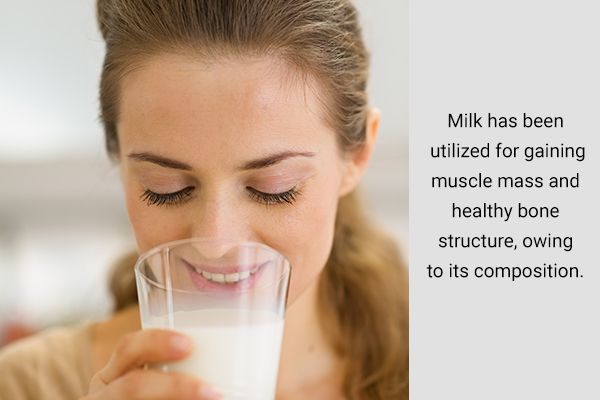
Milk is a balanced mix of carbohydrates, proteins, fats, and certain other essential vitamins and minerals including calcium. For decades, milk has been utilized for gaining muscle mass and healthy bone structure, owing to its composition.
A 2007 study published in the American Journal of Clinical Nutrition reports that drinking skim milk after resistance training helps to build muscle more effectively in comparison with using soy-based products. (3)
It has also been found that milk works as an effective drink to support favorable body composition changes in women undergoing resistance training. (4)
You can drink a glass of milk with your meals, before or after your workout if you are training, or as a healthy shake or smoothie. However, make sure the milk you are buying is organic and non-GMO.
2. Eat plenty of protein
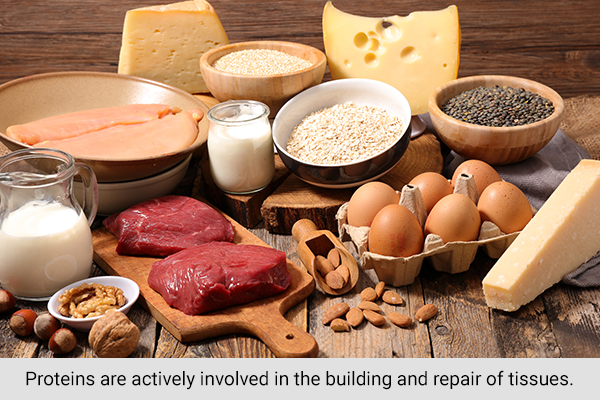
Proteins are actively involved in the building and repair of tissues. Proteins are crucial components of many enzymes and hormones in our body and are responsible for maintaining their structure and function. A protein-rich diet can help you gain muscle mass. Protein affects the storage of lean body mass, but not body fat storage. (5)
However, bear in mind that a protein-rich diet can be highly filling, so you need to keep an eye on your protein intake. The recommended dietary intake of protein is 0.36 grams per pound of body weight in a day.
Consume food rich in proteins such as lean meats, soy, legumes, nuts, steak, protein bars, full-fat yogurt, beans, and cheese to boost your protein intake.
Homemade protein smoothies are loaded with nutrition and are easy to make. You can prepare your smoothies in different variations. Blend all the desired ingredients to a creamy consistency.
How to use:
- Chocolate-banana smoothie: 2 cups milk, two bananas, 1 scoop chocolate whey protein
- Peanut butter smoothie: 1 cup milk, ½ avocado, 3 tbsp organic peanut butter, ¼ tsp cinnamon
- Oats-protein smoothie: 2 cups milk, 1½ cups oatmeal, 2 scoops protein powder, 1 cup Greek yogurt, 2 tbsp almond butter, 1 tbsp coconut oil
- Super green smoothie: ½ cup dates, three bananas, 1 cup kale, 1 cup spinach, ½ cup blueberries, 1 tbsp olive oil, 1 cup milk, 2 scoops protein powder
You can also enrich your smoothie with additional calories by using nutritious sunflower seeds, flaxseeds, or chia seeds. You can choose either dairy or dairy-free milk such as soymilk or almond milk according to your preference.
If you are lactose intolerant, avoid whey protein powder and use a plant-based product instead.
3. Consume breakfast daily
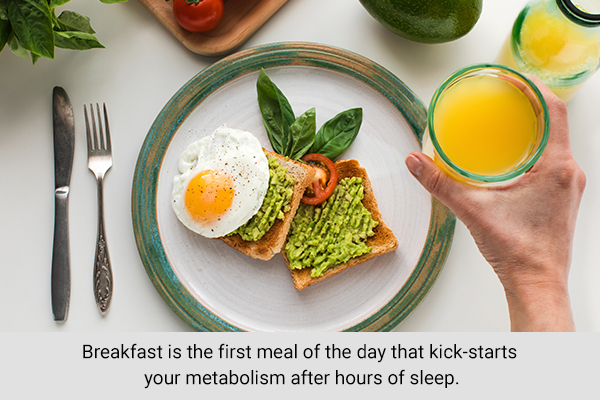
Most people wake up in a hurry and skip breakfast and that’s how they start their day. Despite being the most important meal of the day, breakfast comes at the end of their list of priorities.
Eating a healthy breakfast can bring a huge difference to your lifestyle. Breakfast is the first meal of the day that kick-starts your metabolism after hours of sleep.
It replenishes your glucose levels and revitalizes your body with its energy requirements to keep you running through the day. Consuming breakfast has been identified with an increased appetite, which is a prerequisite for maintaining body weight.
In a 2016 review study published in Proceedings of the Nutrition Society, it was found that skipping breakfast can reduce your dietary intake throughout the day. (6)
A study published in the American Journal of Clinical Nutrition reports that daily breakfast intake leads to higher physical activity thermogenesis in lean adults and greater overall dietary intake. (7)
You can stir up some easy breakfast recipes and accompany them with a glass of milk to feel satiated. Some easy breakfast ideas that won’t steal much of your time are as follows:
- Oatmeal with berries and flaxseed
- Avocado toast with tomatoes
- Veggie omelet and toast
- Hardboiled eggs and toast
4. Drink ashwagandha latte
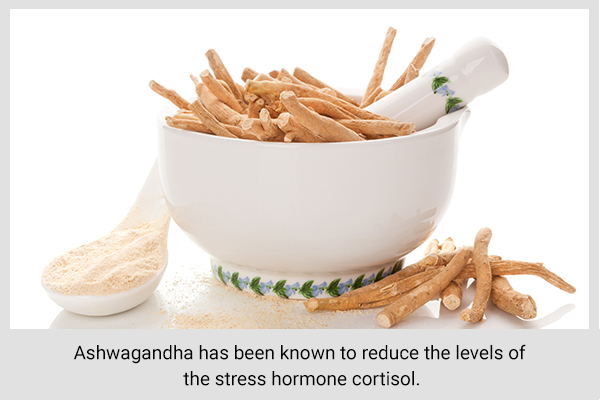
Ashwagandha, scientifically known as Withania somnifera, is one of the many popular herbs in Ayurvedic medicine. It is a natural stress reliever. It has been known to reduce the levels of the stress hormone cortisol and, in turn, promote energy metabolism, stress reduction, and improved immune health – all known to contribute to weight gain.
A 2015 study published in the Journal of the International Society of Sports Nutrition found that ashwagandha supplementation can lead to a significant increase in muscle mass and strength and should be used in conjunction with a resistance training program. (8)
How to use:
- In 1 cup of warm milk, add 2 tbsp of ashwagandha powder.
- Add 1 tsp each of clarified butter and honey.
- Mix well and drink this milk twice daily.
5. Munch on dry fruits
Dry fruits are calorie dense and packed with polyunsaturated fats (PUFA). They also contain the right amount of carbohydrates that will help you gain weight.
A 2009 study published in the American Journal of Clinical Nutrition reports that higher nut consumption was identified with slightly lowering the risk of obesity (9) by moderating the gain in weight.
Almonds, cashew nuts, dates, Brazil nuts, pecans, walnuts, figs, and raisins are high-calorie treats that you can indulge on a daily basis.
How to use:
- You can soak five to six dried figs in water overnight and eat them the next day.
- Eat about 1/5 cup of dried raisins throughout the day.
- Have a handful of almonds, walnuts, or cashew nuts on a daily basis.
- Add three almonds, two dates, and one dried fig to a glass of milk and boil it. Allow it to cool and then strain the milk. Drink warm milk and eat the boiled almonds, figs, and dates.
6. Add eggs to your diet
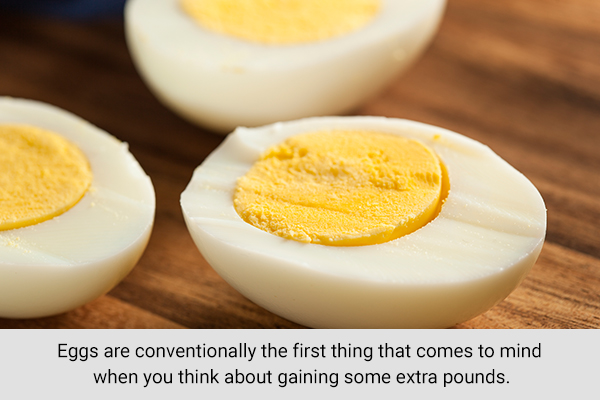
Eggs are conventionally the first thing that comes to mind when you think about gaining some extra pounds. (10) Eggs are nutritious sources of fat and protein that can deliver about 155 calories from a 100 g serving.
The protein in eggs contributes to building muscle mass, whereas the fat provides energy. For best results, prefer egg whites to yolk.
Just eat the white part of about three or four eggs daily. You can eat egg white omelets or scrambled egg whites for breakfast regularly for at least one month.
Caution:
- Raw eggs contain a protein called avidin, which prevents the uptake of biotin (vitamin B7). Therefore, it is recommended to cook eggs before consumption.
- Raw or undercooked eggs can be contaminated with the pathogenic bacteria Salmonella and can cause food poisoning. The risk of an egg being contaminated is very low, but it is advised to consume properly cooked eggs or to use pasteurized eggs.
- Raw eggs hinder the absorption of protein and hence potentially affect the process of your weight gain.
Causes of Unintentional Weight Loss
It takes hours of exercise and patience to lose weight, but what if you lose your extra pounds without sweating them out? As appealing as that sounds, it calls for some serious contemplation.
Fluctuations in weight associated with situations such as bereavement of a loved one, surgery or post-illness weight loss, changes in career, divorce, and any other personal problems are normal and can happen.
However, weight loss without trying is symptomatic of an underlying medical disorder or disease that is likely a cause of concern.
There can be several reasons for being at a weight that is below average:

- Skipping meals or self-induced starvation to reach or maintain your desired body weight or type
- Poor nutrition and irregular eating patterns (often due to poverty and deprivation)
- Eating disorders, such as anorexia nervosa and bulimia nervosa, that are associated with mental illness and need immediate medical attention
- Psychological conditions, such as depression and anxiety, that affect your well-being, resulting in unintentional weight loss
- The inappropriate use of illicit, recreational, or even prescription drugs such as heroin and opiates (substance abuse)
- Some infectious diseases such as tuberculosis, HIV-AIDS, endocarditis (infection of the heart valves), and other bacterial or parasitic infections where the microorganisms absorb the nutrition from the host’s body, rendering the host weak and fragile
- Hormonal imbalance diseases, such as diabetes, hyperthyroidism, and Addison’s disease, that cause a surge in the metabolism
- Diseases of the gut, such as stomach ulcer, Crohn’s disease, ulcerative colitis, inflammatory bowel disease (IBD), celiac disease, and pancreatitis
- Genetic factors
- Tumor- or cancer-induced weight loss
It’s important to take steps to maintain a healthy body weight. Underweight individuals are likely to face many health issues, such as the following:
- Changes in bone density that can eventually result in osteoporosis
- Heart problems
- Infertility
- Developmental delays
- Malnourishment
- Anemia
- An increased risk of complications in the event of any surgery
- Diseases related to nutritional deficiencies
- An immune system rendered weak by frequent episodes of illness
- Long-term ailments such as diabetes, tuberculosis, and diseases of the immune system
According to a 2017 study published in Health and Quality of Life Outcomes, low body mass affects mortality and self-reported health (SRH). (11)
According to the Centers for Disease Control and Prevention (CDC), the percentage of underweight adults in the USA has decreased from 3 percent to 1.9 percent between 1988 and 2008, (12) but the number of underweight adults is still high.
Additional Tips That Can Aid in Weight Gain
- Use bigger plates to fool your mind to increase your calorie intake.
- Potatoes, sweet potatoes, and rice are rich sources of carbohydrates and complex sugars. Include more of these in your diet to ensure weight gain. You can also include other food items such as avocados, buckwheat, cereal bars, oats, and quinoa in your diet to boost your calorie intake.
- Adding organic clarified butter or ghee to your diet is an excellent way to gain weight as it is a source of saturated fat and calories.
- Bananas can give you an instant energy lift and can help you gain weight. Consume a few of them on a daily basis or as shakes.
- Peanut butter is high in calories and carbohydrates, making it an excellent choice for gaining weight. Use it as a spread on your bread.
- Try to include smaller and more frequent meals and healthy snacks in your diet plan.
- Avoid drinking water just before your meal, as it can decrease your appetite.
- Include a workout regime to stimulate your appetite.
- Quit smoking.
- Avoid binging on empty calories such as soda, candy, chips, ice cream, and baked foods to gain weight. These will increase your cholesterol levels along with your weight. Instead, choose options that are nutritious besides being a calorie surplus.
When to See a Doctor

Unintentional weight loss is the loss of at least 10 pounds or 5 percent of the body weight over a period of 6 to 12 months.
If you are experiencing persistent weight loss without any effort of dieting and exercising or without knowledge of any underlying cause that entails weight loss, it is a cause for concern and warrants medical attention.
Your doctor will evaluate the possible causes for this unexplained weight loss to reach a final diagnosis and then recommend the necessary treatment accordingly.
Final Word
Losing weight without any discernible reason is usually symptomatic of an underlying condition that needs to be diagnosed and treated for you to regain your health.
The weight loss won’t stop until the root cause is addressed and can seriously deteriorate your overall health and performance. So, early diagnosis and treatment is the best way to avoid more serious complications.
That said, you can also try the above listed dietary tips to regain your lost pounds in a healthy manner. But remember to be patient as the road to recovery can be a little time consuming. Putting back the weight without compromising on your nutrition and health is a long and gradual process that should not be rushed.
Resorting to quick hacks and adopting unhealthy eating habits may make you plump quickly, but will undermine your body function and vitality.
- Was this article helpful?
- YES, THANKS!NOT REALLY


